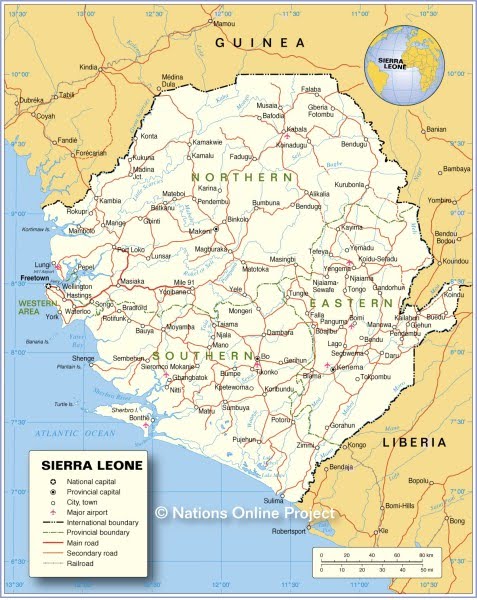
Climate Change – Harmattan style
It’s here, the Harmattan has arrived! The Harmattan is a dry and dusty West African trade wind, which blows south from the Sahara into the Gulf of Guinea for what constitutes the dry season for Salone.
The word Harmattan may be from the Arabic ḥarām, evil thing, but, given that it arrived within a two day period, we are no longer sweating profusely when doing physical activities, despite it being hotter (30C), it’s not all bad news. It also marks a significant shift in food production and agriculture that requires respect and reflection, after all, this is the time to talk “climate change” seasonal or otherwise, especially when you are not in Copenhagen.
With the exception of the Freetown peninsula, the whole of Salone’s coastal area and also that of it neighbours Guinea and Liberia, are low lying and subject to the impact of the change in sea levels. The worst example of this is in Liberia, where the majority of the population live in coastal cities including the capital city of Monrovia where 200,000 people (one fifth of the population) live less than a metre above a sea level that has been rising significantly in recent years. Some districts have seen the loss of land, previously a kilometre from the Atlantic Ocean. A study commissioned by the Liberian government suggests it could cost up to $175m (£106m) to build sea defences at Liberia's five major cities. Such an amount is about half the national budget and therefore the government has submitted a request to help protect Monrovia, to a fund set up by the United Nations, after the Kyoto Protocol, agreed by the majority of the world's countries a decade ago.
A position paper on Climate Change, written for the delegation from Sierra Leone to Copenhagen, indicates a dramatic change in recent years with Salone’s dry season being reduced from six months to three months per year. This drastic change had provided many critical issues for the government of Sierra Leone. The prolonged humid season has increased the prevalence of mosquitoes and malaria has become a nationwide epidemic. This in turn threatens the achievement of the Millennium Development Goals (MDGs) set by United Nations to reduce extreme poverty, reduce child mortality rates, fight disease epidemics such as AIDS, and develop a global partnership for development by 2015.
In Guinea, the nation’s attention may well be on the current political climate and not that of the climate change summit in Denmark. Since the death of Guinea’s President late in 2008, the country has been governed by a military junta under the leadership of Capt. Moussa Dadis Camara , who was only a child when the late president took power 24 years previously. Dadis, as he is known by Guineans, promised to establish a multi-party democracy and announced that he had no intention to become the nation’s president. In September 2009, when rumours of his new presidential aspirations began to circulate, a mass rally of opposition was held in by a political party in a football stadium of Conakry, the nation’s capital. This peaceful and well attended event concluded with un-precedent episode of rape and tortured and the death of over 150 people, for which the military appear to entirely responsible for.
Condemnation by the African Union and the global community, of the atrocities, led to a United Nation’s team being sent to conduct a full investigation and whilst the enquiry was taking place last week, Captain Dadis Camara was said to have been shot in the head and flown to Morocco, where he continues to undergo treatment. Whilst the soldier suspected of the shooting, Lt. Toumba Diakite, is still on the run in Guinea, scores of military personnel have been arrested. Meanwhile Capt. Camara's deputies have tried to squash rumours of a power vacuum and confusion over who is in charge. The interim leader, Gen. Sekouba Konate recently appeared on television, for the first time since the shooting, to urge unity and military discipline, whilst further announcements suggest a protracted delay in the return of Capt. Dadis Camara.
The talks in Copenhagen addressing our fragile eco-system are of paramount importance to the whole of humanity and yet it is clear that some nations are under greater threat from the effects of climate change than others. The term ‘fragile state’ is a composite, multi-dimensional description that depicts life in Guinea, Liberia and Sierra Leone in numerous ways, including sharing the same eco-geo-political climate.
11 December 2009

No comments:
Post a Comment